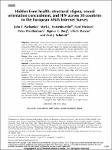Hidden from health: structural stigma, sexual orientation concealment, and HIV across 38 countries in the European MSM Internet Survey
Pachankis, John E.
Hatzenbuehler, Mark L.
Hickson, Ford
Weatherburn, Peter
Berg, Rigmor C.
Marcus, Ulrich
Schmidt, Axel J.
Objective: Substantial country-level variation exists in prejudiced attitudes towards male homosexuality and in the extent to which countries promote the unequal treatment of MSM through discriminatory laws. The impact and underlying mechanisms of country-level stigma on odds of diagnosed HIV, sexual opportunities, and experience of HIV-prevention services, needs and behaviours have rarely been examined, however. Design: Data come from the European MSM Internet Survey (EMIS), which was administered between June and August 2010 across 38 European countries (N = 174 209). Methods: Country-level stigma was assessed using a combination of national laws and policies affecting sexual minorities and a measure of attitudes held by the citizens of each country. We also assessed concealment, HIV status, number of past 12-month male sex partners, and eight HIV-preventive services, knowledge, and behavioural outcomes. Results: MSM living in countries with higher levels of stigma had reduced odds of diagnosed HIV and fewer partners but higher odds of sexual risk behaviour, unmet prevention needs, not using testing services, and not discussing their sexuality in testing services. Sexual orientation concealment mediated associations between country-level stigma and these outcomes. Conclusion: Country-level stigma may have historically limited HIV transmission opportunities among MSM, but by restricting MSM's public visibility, it also reduces MSM's ability to access HIV-preventive services, knowledge and precautionary behaviours. These findings suggest that MSM in European countries with high levels of stigma are vulnerable to HIV infection. Although they have less opportunity to identify and contact other MSM, this might change with emerging technologies.
Dateien zu dieser Publikation
Keine Lizenzangabe

